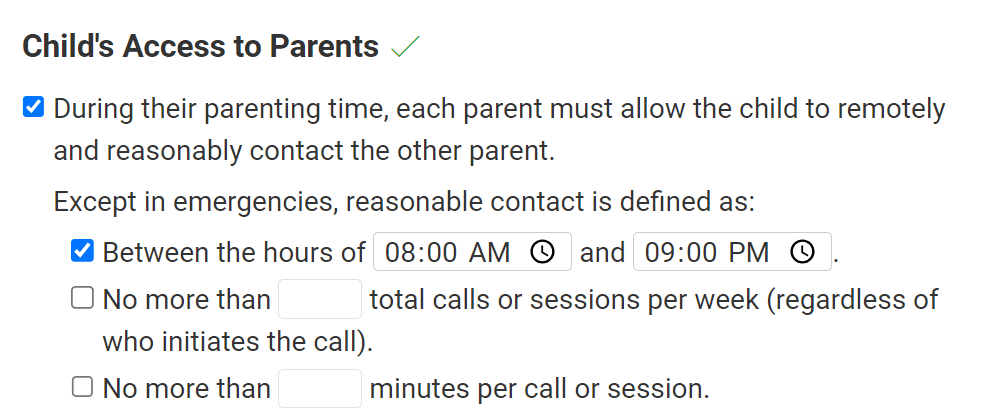Nebraska Parenting Plans (Custody Agreements)
Your parenting plan describes how you'll cooperate after a divorce or separation. Writing a parenting plan together can resolve many of your disagreements. If you don't have any parenting issues for the court to decide, you'll avoid trial.
When and how to write a parenting plan
Draft your parenting plan together if you can. The court is likely to approve your agreement. It'll also be easier for both of you to stick to (and help each other stick to) a plan you've developed together, rather than one the court imposes on you.
If necessary, you can each propose a parenting plan separately. Providing a thorough, organized document makes a good impression on the judge.
While your case is ongoing, if you're not working together well, you can ask for a temporary order. This would give you both a parenting time schedule and possibly additional parenting rules to follow during your case. You could be required to move out of your shared house or share information (like your child's medical records). You can propose a temporary parenting plan (individually or both of you together) when you ask for the order.
Unless you've settled your parenting issues, you'll likely be ordered to mediation to try to reach a final agreement. If you can't settle, you'll head to trial to let the judge decide. The judge could choose one of your proposed parenting plans or write their own.
Choosing a template
You may write your plan yourself, though if you do, consider hiring a family lawyer at least to look over your proposal. They may think of something you've forgotten or haven't described well.
Nebraska has sample parenting plans for a few basic scenarios:
- Joint Legal and Joint Physical Custody
- Joint Legal and Sole Physical Custody
- Sole Legal and Sole Physical Custody
- Absent Parent
If you use those, you type a small amount of information in your plan and print it out.
Many people prefer to use an app. The Custody X Change parenting plan template offers more than 140 standard provisions while letting you add as many custom provisions as you need.
 Try this with Custody X Change.
Try this with Custody X Change.
The app also:
- Lets you build a visual custody schedule by clicking and dragging in a calendar
- Automatically describes the schedule in words
- Calculates your overnights, which helps determine the correct amount of child support
- Can notify you when it's time to transfer your child between parents

What to cover: Parenting rules
Nebraska law lists provisions your parenting plan must address:
- Legal custody and physical custody
- Encouragement for both of you to discuss major decisions regarding your child's schooling, health care and religion (if "safe and appropriate")
- How you'll make decisions (separately or together) about your child's day-to-day care
- Parenting time (regular schedule and holiday schedule)
- Where your child will live during each parent's time
- Hours at which each of you may call your child during the other parent's time
- When, where and how you'll transfer your child (aka a transition plan), and how you'll communicate with each other related to these transfers
- Details about going to mediation, should any change to the parenting plan be necessary
- How you'll ensure that your child attends school and advances in their studies
- A safety plan, should your child ever be at risk from abuse, neglect or parental conflict
- A requirement that you notify each other of any new address (limited to county and state if there's a safety concern)
Your parenting plan must consider your child's age, developmental needs and perspective and should enhance healthy parent–child relationships.
Beyond that, your parenting plan may discuss anything you find relevant to your child's care. Optional subjects include:
- Belongings (e.g, sports gear, musical instruments, favorite toys)
- Extracurricular activities
- Social media use
- How a parent's new partner may be introduced into your child's life
- Safety issues particular to your households (e.g., guns, swimming pools, alcohol)
- How your parenting rules or schedule may change if one parent moves farther away
If you need to change or enforce your parenting plan
In most cases, the court will require you to try mediation again. Use the mediation method you wrote into your parenting plan, or — if there isn't any, or if it won't work for you — contact your district court's Conciliation and Mediation Services.
If you can't reach agreement, file a Complaint for the Modification of Custody or Parenting Plan and serve the other parent. You have to say when you tried mediation and what the outcome was. The court will hear your arguments and may issue a revised parenting plan.
The same applies if you're asking the court to enforce the parenting plan. You must first try mediation, then file an Affidavit and Application for Order to Show Cause.
These forms are available from the Nebraska Judicial Branch.
The easiest way to make a parenting plan
When you're writing a parenting plan, it's critical you use airtight language that leaves no room for interpretation. You must also be careful not to omit any information required by the court.
If you hire a lawyer, they'll write up the plan for you and ensure it meets the judge's expectations.
If you write your own plan, use technology to take guesswork out of the equation. The parenting plan template in the Custody X Change online app walks you through each step.

The result is a professional document that demonstrates your competence as a parent from the first glance.
The easiest and most reliable way to make a parenting plan is with Custody X Change.
